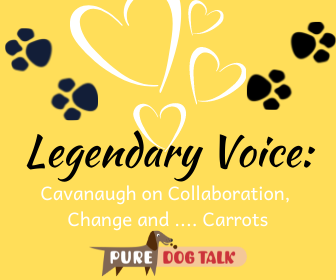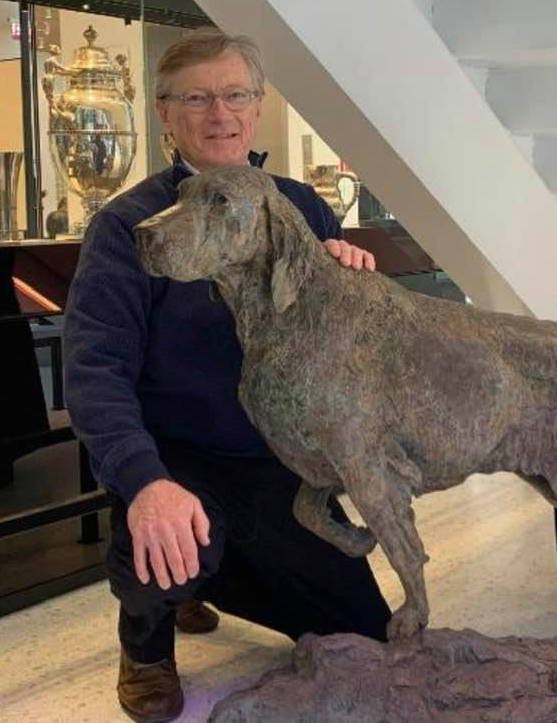487 — Cavanaugh on Collaboration, Change and Carrots
Cavanaugh on Collaboration, Change and Carrots
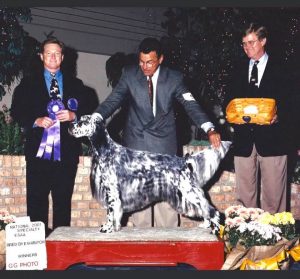
Wayne Cavanaugh awarding Winners Dog at the 2001 English Setter Association of America. The handler is Elliott Weiss.
Wayne Cavanaugh joins host Laura Reeves for part two of their conversation. Today they are talking about collaboration versus competition, changes for better and worse in purebred dogs over time and how carrots work better than sticks in implementing initiatives.
Cavanaugh shares stories from his time at the United Kennel Club, building programs and growing the organization, including creating a system that incentivized breeders to DNA test their dogs.
“I had two ways to do that,” Cavanaugh said. “One I could say it’s mandatory, you can’t enter (without DNA)… With coonhound guys, that would not work out. So, we started a program that if you got a (DNA) number you could put it in your ad in the magazine. When offspring of that DNA profiled dog won anything, (the sire) got points. Those points turned into dollars. At the end of the year, owners of those dogs got a check. Some of them got a big check.
Hands-on and possibly quirky would best describe Cavanaugh’s managerial style, from answering the phones at UKC headquarters to driving his motorcycle to work and parking it in the hallway.
“One thing I recommend every business do. I’d shut it (UKC offices) down for two days every year. We rented this gorgeous conference room here in town. And I did two days of telling every single department employee exactly why their job is important and here’s how much money we’re making. Here’s the percentages of growth, not the dollars. Here’s where we’re growing. Here’s why your job down here made this happen.
“We just tried to do that, to keep things human.”
Collaboration
“One of the things I did in Kalamazoo, was I invited every registry that was over 100 years old in America to come to Kalamazoo for a conference … We (needed to be) working together because we had animal rights issues to work with, we had zoning things, we had breed specific things to worry about.”
Changes
“When my dad was breeding Beagles, we put an ad in the local newspaper. Someone would buy a puppy from us. You give us the money, we give you the papers. No limited (registration), no contract, whatever. Then they would call a year or two later … and say ‘Ray, my cousin’s nephew’s electrician has a Beagle and we’re going to plug them in. You wanna help?’ My fater would help. The people would go through the process, the kids witnessed the miracle of birth, it was a mess, they never did it again. But people had pets. They had purebred pets. Maybe they didn’t look so great, who are we to tell him this, they loved him anyway. What was wrong with Americans have ugly Beagles or ugly Irish setters are ugly whatever’s? There was nothing wrong with that.
There’s a reason people like Goldendoodles. We did part of that, at least part of it, to ourselves. (We need to) take some ownership. I send friends of mine who wanna Labrador to Labrador breeder. They say ‘hey they were nice, dogs are great, but I don’t have two years to wait. I’m 37th on the waiting list, they gave me this 90-page contract, they want to come to survey my yard and turn in my work hours … we just wanna pet!’
486 — Wayne Cavanaugh: the “Total Dog” Man
Wayne Cavanaugh: the “Total Dog” Man
Wayne Cavanaugh is literally the “total dog” man. In every conceivable way. He is a third-generation dog breeder and fancier. He worked for the American Kennel Club, the United Kennel Club, Wall Street and Animal Planet. He created the Total Dog program for UKC, was a charter board member of the AKC Canine Health Foundation and worked for legendary handlers Bob and Jane Forsyth in their heyday.
Cavanaugh shares his fascinating and high-octane journey through the entire purebred dog world with host Laura Reeves in this first of a two-part series.
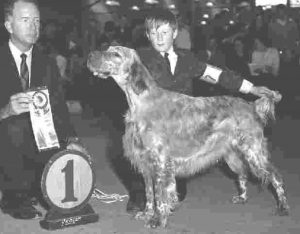 “I was born in the sport,” Cavanaugh noted. “My grandfather came over from Ireland and he had some Kerries … it was that time of the world when you’re worried more about eating and getting by and wars, but he stayed involved. My dad picked it up with Beagles. It’s a debate whether I was six or eight when I finished my first Beagle. But we do know one thing. It probably was because there were a lot of people of profile that walked me up to the ring guided me in with a Beagle. It’s not like I was full of talent.
“I was born in the sport,” Cavanaugh noted. “My grandfather came over from Ireland and he had some Kerries … it was that time of the world when you’re worried more about eating and getting by and wars, but he stayed involved. My dad picked it up with Beagles. It’s a debate whether I was six or eight when I finished my first Beagle. But we do know one thing. It probably was because there were a lot of people of profile that walked me up to the ring guided me in with a Beagle. It’s not like I was full of talent.
“As soon as I was able to reach both ends, I decided the English Setter would be fancier for junior showmanship than a Beagle. My dad helped me get going in English Setters.
“I went to work for Bob and Jane (Forsyth). They had just bought a Beagle from my father for Bob to show … That’s how I got to meet Bob. I was very young. They hired me to work there. It was an experience of a lifetime. No one can explain it. 100 dogs in the kennel, all of them are the best ones. You worked really hard and you didn’t mind. The education was unbelievable.
Seeing good dogs, working with them, is so important. You can’t really form a template in your head without seeing real good ones. And we had real good ones. We would win all six groups, there only six back then, it wouldn’t be unusual to do so. But it was great experience. Not only in dogs, but in life. They were a great team and it was really beautiful to watch them work together.
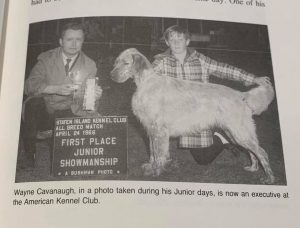 Cavanaugh travels back in time to recreate the walnut paneled walls of the American Kennel Club offices in the late ‘80s and early ‘90s. “We had everything but cigars.” All the way to the addition of the first women’s restroom in the offices when Judy Daniels was elected President.
Cavanaugh travels back in time to recreate the walnut paneled walls of the American Kennel Club offices in the late ‘80s and early ‘90s. “We had everything but cigars.” All the way to the addition of the first women’s restroom in the offices when Judy Daniels was elected President.
The journey continues through his work on Animal Planet’s “Breed All About It” show and on to the development of the UKC’s Premiere Show and Total Dog Program. An amazing step back through the looking glass with a true “dog man.”
Don’t forget to check back next week for part two of this inspiring conversation.

